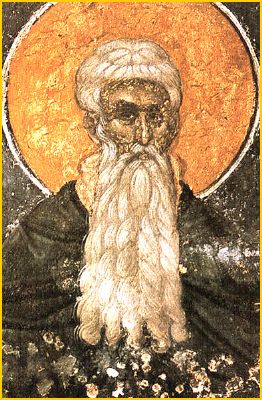|
|||
|---|---|---|---|
| This weekly bulletin insert complements the curriculum published by the Department of Christian Education of the Orthodox Church in America. This and many other Christian Education resources are available at http://dce.oca.org. | |||

Saint Arsenius the Great is a revered example of monasticism and also a teacher who knew how to inspire and encourage. He was born to a cultured Roman family in 354 and received an excellent education. He chose not to follow the worldly paths open to him, and was ordained a deacon. Quiet and retiring, he was content to serve in that capacity in one of Rome's churches. But Emperor Theodosius knew of his learning, high moral character, and prayerful life. The emperor felt he had found the perfect man to serve as tutor to his two sons, and summoned Arsenius to the imperial court. Arsenius did his best with the two high-spirited boys. But for such a lover of silence, with no wish to be singled out or even noticed, court life was a painful burden rather than an honor. The court constantly bustled with activity and chatter. People frequently noticed him--he had, after all, been chosen to educate young men who might one day be rulers. It all became too much, and he decided to heed the interior voice that kept urging him to go and find silence and solitude. He changed from his court dress into simple clothes, made his way to the coast and boarded a ship sailing for Egypt. Once there, Arsenius headed for the desert with its famous monasteries. He joined one, after proving himself to the elders, and spent the rest of his life in a remote desert cell where he wove baskets and prayed. He joined others only for the Divine Liturgy at the monastery church. Yet this man who so loved to be alone with God also had a generous willingness to teach the many who heard of his great spiritual labors and came to him for counsel. "The Prologue from Ochrid" gives us the story of a monk who came to Arsenius with a serious problem: when he read Scripture, he didn't feel the power of the words, and he felt no sweetness in his heart.
Arsenius didn't dismiss the monk with a curt, "Try harder!" Instead he used a memorable image as a way of encouraging the man to keep reading, even if the words didn't touch his heart. A snake charmer, he said, doesn't understand the words he is saying, but the snake understands and is tamed by them. Similarly, if you keep the words of Scripture on your lips, the demons who understand and hate those words of the Holy Spirit will flee. At the same time (and here he wisely promised his monk-student a satisfying result) the Holy Spirit who inspired those words will also understand, and will be quick to help you. We can remember Saint Arsenius for this example of good teaching, but he has also left another lesson: "I have often regretted the things I have said, but I have never regretted my silence." |
|||
